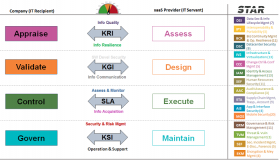
Because the inescapable evolution of IT to factory model, using Cloud, Customers need to understand and to adopt a tool in order to usefully continue to govern IT, as provided by services they are benefitting from, as it were still crafted in-house. Such a tool should act as proper interface between IT Service Recipients and IT Service Providers, allowing:
- Dashboard: it should provide a outlook of the services status, containing Key Indicators
- Areas: thorough performances should be evaluated, by proper KPIs splitted in areas like; Risk, Goal, Service Level and Security ones
- Accuracy: the actual evaluations and measurements should be accurate
- Interface: it should represent the official communication mean, between buyer and seller, for conducting the service agreement.
Dashboard
It is not difficult for provider to provide such a tool to customers
Dashboard Areas
In order to provide effective tool, the areas of evaluation should be splitted for better addressing skills and time of intervention. Based on Deming cycle, the following four areas were identified:
|
Area |
Customer |
Provider |
Indicators |
Description |
|
Plan |
Appraise |
Assess |
KRI: Risk |
Provider assesses Mgmt about IT-Sec, BC, etc Customer appraises the results |
|
Do |
Validate |
Design |
KGI: Goal |
Provider designs the solution, on the basis of customer’s needs Customer validates |
|
Act |
Control |
Execute |
SLA: Service Level provided |
Provider executes operational tasks Customer controls the observance of agreed SLAs |
|
Check |
Govern |
Maintain |
KSI: Security |
Provider manages to maintain service levels Customer manages to govern service direction |
Accuracy
The measurements should be authentic, careful and correct. Provider supplies all the KPIs but those than fit Audit goals.
Interface
Not measurements coming from other sources than Dashboard could be accepted for execution of the SLAs contained in the agreement.
